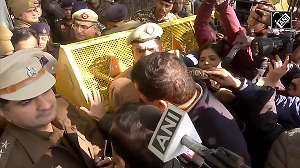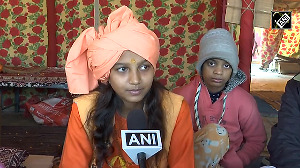Will India's cricketers accept the anti-doping rules in toto? Will the Board of Control for Cricket in India have its way?
These are the questions being asked in the wake of the Indian cricket board's refusal to accept the 'whereabouts' clause of the World Anti-Doping Agency and back its players' refusal to sign up to the directive.
"The clause with regards to whereabouts is unreasonable," BCCI president Shashank Manohar said after an emergency meeting in Mumbai on Sunday to discuss the issue.
The Indian cricketers missed the August 1 deadline to comply with the regulations, arguing that the whereabouts clause is "unreasonable".
The code states that an International Registered Testing Pool (IRTP) of players must be created, to nominate them for random testing, based on their ICC rankings. Players from the pool have to inform the ICC at the beginning of every quarter (three-month period) of the year, a location and time that they will be available for an hour each day in that quarter for testing.
However, the BCCI has asked the International Cricket Council, a WADA signatory, to explore the possibilities of having a separate anti-doping mechanism of its own.
Sports Minister M S Gill on Monday opposed the BCCI's stance, and urged the cricketers and the Board to fall in line without cribbing. He dismissed the claim that the clause -- which requires players to inform about their whereabouts three months in advance for out-of-competition testing -- is an infringement on their privacy, saying, "We have accepted WADA regulatory testing and we adhere to it. Sportspersons should be clear in one thing that it is not getting into someone's life.
"All sportspersons should adhere to it and happily follow it, as so many sports federations and players are following it," Gill said.
Football, even though it is an Olympic sport, has refused to comply with the ruling. FIFA, the ruling body, has proposed to WADA that only players they deem high-risk should be part of the 'whereabouts' clause.
Even top tennis stars like Roger Federer and Rafael Nadal have expressed reservations about the controversial clause, as they are not in favour of disclosing their availability at all times.
The dilemma for ICC, which became a signatory of WADA in 2006, is that if it fails to comply with the anti-doping norms fully it could affect the sport's chance of participating in competitions, like the Asian Games and Olympics. On the other hand, it also cannot go against a powerful member like India and bar Indian players from taking part in top international events like the World Cup and Champions Trophy.
So, what's the solution to the latest controversy to hit Indian cricket? Are the Indian players and BCCI are right in not signing the anti-doping code? Should the players fall in line and sign up for the clause like all the other top athletes around the world?
Your take could help. Have your say!







 © 2025 Rediff.com -
© 2025 Rediff.com -